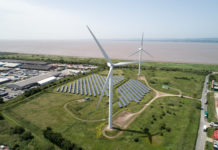Ofgem’s targeted charging review (TCR) could significantly slow the build out of unsubsidised renewables and lead to a ramp up of new gas fired generation, according to Aurora.
The consultancy said the TCR and other changes the regulator is pushing through may also require the government to restart subsidy schemes for onshore wind and solar if the UK is to hit carbon targets.
Batteries and demand-side response will also lose out, according to Aurora’s models.
Regime change
Ofgem is trying to reduce distortions in network charging regimes which it believes are being exploited by generators to the detriment of other system users.
Under its charging review proposals, generators connected to the distribution network will lose certain financial benefits, while others will flip from benefits to charges.
The proposed changes will remove significant chunks of existing generators’ revenues, damaging investor confidence, said Aurora. They also make investment cases for new distributed generation less compelling.
If the capacity market (CM) is reinstated without major changes, following the European Commission’s investigation, Aurora predicts CM prices will have to annually rise by £6-£12/kW in order to make up the revenue shortfall resulting from the TCR.
By definition, the capacity market pays for capacity – which has to be dispatchable when required. Wind and solar assets are currently unable to bid for capacity agreements. That means they cannot make up revenue via the CM.
Meanwhile shorter duration batteries have been de-rated so that they receive only a fraction of the headline price. Some parts of the industry are also pushing for demand-side response to be de-rated within the five-year review of the policy, though appetite may diminish given the ongoing investigation was triggered by DSR company Tempus Energy.
The upshot, according to Aurora’s models, is that the build out of subsidy-free renewables will be delayed by 2-5 years if the TCR implemented as currently envisaged under Ofgem’s ‘preferred options’.
‘Spooked’ investors
In the context of the Committee on Climate Change’s recommendation of a 2050 net zero carbon target, government may therefore need to fund new subsidies to avoid a multiyear renewables hiatus, said Aurora report co-author, Weijie Mak.
“If we are going to push through with TCR … it might require a subsidy regime to ensure the viability of renewables is not affected,” he told The Energyst.
Mak said investors, particularly US investors, are “starting to get spooked” due to the volume of regulatory change underway and the suspension of the CM. “Investment into the power sector could be delayed due to policy uncertainty,” he suggested.
Mak said Ofgem “must provide very clear guidance into the future” and investors and developers given sufficient time to react to potentially radical changes.
Existing asset owners that stand to lose anticipated revenues may need grandfathering or a phased step down, he suggested, to avoid further loss of investor appetite.
Increased carbon emissions
With multiple uncertainties in play, Mak said it is “hard to distill the full impact of the TCR”.
However, should the CM be reinstated without major changes and the TCR be implemented as indicated, carbon emissions may increase, according to Aurora.
“What we see is that by 2030, overall carbon emissions will increase by about 5% considering the drop off of solar and wind,” said Mak. “But the key uncertainty is offshore wind.”
If CfD support is maintained and the offshore wind buildout continues at pace, the 2030 carbon target can be met, he suggested. But meeting 2040 and 2050 targets is far less certain, particularly if they are toughened. That might require new subsidies – at least for a few years before capex costs fall to make unsubsidised developments financially viable, according to Aurora.
“If the TCR comes in and we don’t see sufficient build up of subsidy-free renewables, then government might need to consider putting that back on their radar,” said Mak.
Aurora has previously recommended a redesign of the CM to bring in renewables.
See the report here.
Related stories:
Aurora: Power sector will need redesign to fully decarbonise
Aurora: Bring renewables into reformed capacity market to save money
Aurora: Murky markets undermining corporate PPAs
Aurora: EVs will not require new power stations
Aurora: GB could hit 30GW of offshore wind with balancing access and zero subsidy CfDs
Aurora: Battery storage, DSR and peakers to hit 25GW
Half of small generators ‘could give up capacity market contracts’ after Triad cuts
Follow us at @EnergystMedia. For regular bulletins, sign up for the free newsletter.



